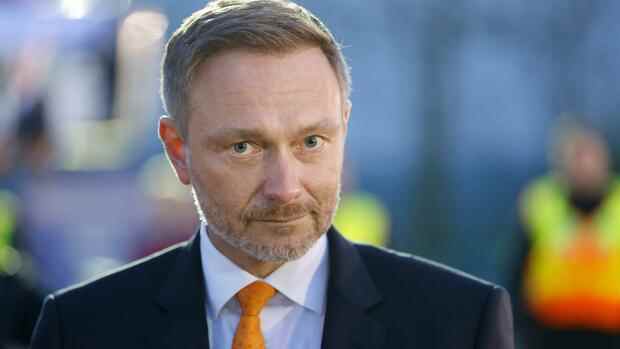Driven by the crises and his coalition partners?
(Photo: dpa)
The Ukraine war brought a financial revolution to Germany. It went down in the turmoil of war, but it’s worth looking at again: In order to relieve citizens of fuel and energy prices, the federal government is taking on additional liabilities. The traffic light government is thus financing current consumption through debt. So far, debts were only intended for future investments.
Now one can be of the opinion that extraordinary times call for extraordinary measures. Fiscal-political pietism does not help any citizen at the gas pump. Nonetheless, the traffic light crosses what had previously been a thick fiscal policy red line.
The new financial policy, which is often referred to as “progressive”, is not only being pushed to the extreme under a liberal finance minister. It has also reached its peak so far at a time when cautious financial politicians once again had good arguments on their side.
The supporters of higher debt were unsubscribed for many years. But then, over the past few years, they have succeeded in turning the debt debate in Germany at a speed that was not thought possible. In doing so, however, they made the mistake of exaggerating in the exuberance of the regained importance. They believed they had found a new economic law of nature: that of constantly low interest rates, which gave politicians a completely new scope for debt. As long as interest rates are low, the logic goes, debt may not be high enough.
Top jobs of the day
Find the best jobs now and
be notified by email.
The supposed financial policy avant-gardists turned out to be false prophets when it came to inflation rates. Pandemics can break out, wars. Economics is not a natural science.
The two illusions of fiscal policy
In addition to this interest rate illusion, there is a second, widespread illusion: that of the fiscal illusion. The federal government acts as if it can easily finance all crises, expand the welfare state at the same time and, despite everything, remain a role model for the world in terms of financial policy.
Federal Minister of Finance Lindner recently aptly described one downside in the state budget. Politicians are facing more and more challenges: combating climate change, digitization, the after-effects of the pandemic were already there. Now the Ukraine war is also taking the peacetime dividend out of the budget. In addition to the renovation of the concrete infrastructure and the construction of a new energy policy infrastructure, a general overhaul of the security policy infrastructure is also necessary.
What Lindner has not been able to do so far, however, is to develop a coherent overall strategy from these challenges. Without such, however, Lindner will always be driven by the crises and his coalition partners. And as a liberal finance minister, he cannot have any interest in that.
In any case, the picture that Lindner has been trying to convey so far is not consistent. He rejects tax increases for good reasons. The coalition withheld the spending cuts indicated in the coalition agreement while pursuing all spending projects with Prussian discipline.
An asteroid could well fall from the sky, Social Affairs Minister Heil would still want to stabilize the pension level. And after various ministers rocked the health system down financially, the only way out of the financial malaise is higher tax subsidies.
Why the debt brake is hardly tenable
To want to comply with the debt brake under these framework conditions, as promised by Lindner, is to square the circle, whereby even this description is enough of a euphemism.
In any case, more growth will not save Lindner. Due to ongoing crises, the post-corona recovery is being postponed, and due to demographics, Germany is facing a long phase of low potential growth.
Lindner is therefore in the following decision-making quadrilateral: prevent spending, cut spending, increase taxes or get into more debt.
Everything points to the latter option. Lindner and Habeck may be tempted to incorporate into their blood, sweat and tears speeches – because it sounds so contemporary – that the Germans would now have to put up with further hardships in addition to the high inflation, but in political reality that will not be the case withstand.
In turn, raising taxes would be poison for the economy in the current situation, as you know in the SPD. There is only one way out: suspend the debt brake again and then leave it to languish gently.
Sometime after the state elections in North Rhine-Westphalia in May, the time will probably come. Until then, the fiscal illusion will continue.
More: The traffic light’s two billion package
